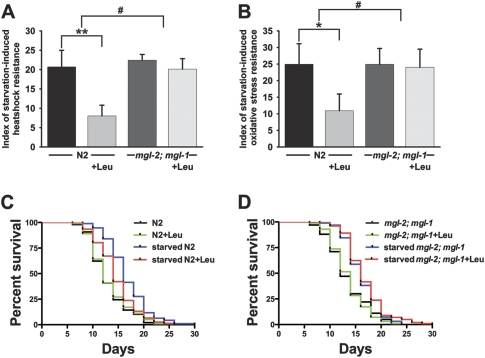Figure 4.
Starvation induces hormesis, treatment with leucine partially suppresses it in wild-type worms, and the effect of leucine is abolished in mgl-2; mgl-1 mutants. (A,B) Indexes of starvation-induced heat-shock resistance and oxidative stress resistance were calculated as described in the Materials and Methods. Starvation induces heat-shock resistance and oxidative stress resistance, treatment with leucine partially suppresses it in wild-type worms, and the effect of leucine is not observed in mgl-2; mgl-1 mutants. Data were combined from at least four independent experiments (n = 389∼2458 for each heat-shock experiment and n = 213∼1181 for each oxidative stress resistance). (*) P < 0.05; (**) P < 0.01 (Student's t-test, paired); (#) P < 0.05 (Student's t-test, unpaired). (C,D) Life span curves represent combined data from two independent experiments (n = 76∼101). Starvation extends life span, and treatment with leucine partially suppresses the life span extension in wild-type worms (starved N2, 16.74 ± 0.04 vs. starved N2 with leucine, 14.61 ± 0.05, P < 0.005, Mantel-Cox Log-rank test). Effect of leucine is not observed in mgl-2; mgl-1 mutants (starved mgl-2; mgl-1, 16.23 ± 0.03 vs. starved mgl-2; mgl-1 with leucine, 16.73 ± 0.04).

